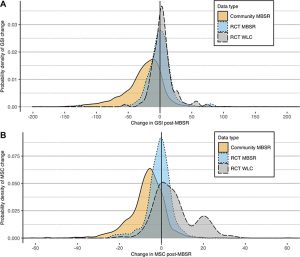Mindfulness Training Produces no Harm
By John M. de Castro, Ph.D.
“the occurrence of AEs during or after meditation practices is not uncommon, and may occur in individuals with no previous history of mental health problems.” – M. Farias
People begin meditation with the misconception that meditation will help them escape from their problems. Nothing could be further from the truth. In fact, meditation does the exact opposite, forcing the meditator to confront their issues. In meditation, the practitioner tries to quiet the mind. But, in that relaxed quiet state, powerful, highly emotionally charged thoughts and memories are likely to emerge. The strength here is that meditation is a wonderful occasion to begin to deal with these issues. But often the thoughts or memories are overwhelming. At times, professional therapeutic intervention may be needed.
Many practitioners never experience these negative experiences or only experience very mild states. There are, however, few systematic studies of the extent of negative experiences. In general, the research has reported that unwanted (negative) experiences are quite common with meditators, but for the most part, are short-lived and mild. There is, however, a great need for more research into the nature of the experiences that occur during meditation.
In today’s Research News article “). Prevalence of harm in mindfulness-based stress reduction.” (See summary below or view the full text of the study at: https://www.ncbi.nlm.nih.gov/pmc/articles/PMC7889774/ ) Hirshberg and colleagues compared patients who had received treatment with Mindfulness-Based Stress Reduction (MBSR) program to those on a wait-list. MBSR was either delivered in community settings or was part of a formal randomized clinical trial and consisted of 8 weekly 2.5-hour sessions involving meditation, yoga, body scan, and group discussion with daily homework. They were measured before and after treatment for global psychological symptom severity and bothersome physical symptoms. They were also measured for anxiety, depression, interpersonal sensitivity, paranoid ideation, and psychoticism.
They found that Mindfulness-Based Stress Reduction (MBSR) significantly improved psychological and physical symptoms and only a small number of patients experienced increases in symptoms at a much lower proportion than control participants. There was not a single comparison in which MBSR led to greater harm than occurred in controls.
Hence, no evidence was found that mindfulness training led to harm greater than with no treatment while there was clear evidence for mindfulness training producing significantly lower levels of psychological and physical symptoms.
Mindfulness-Based Stress Reduction (MBSR) was clearly a safe and effective treatment to improve mental and physical well-being,
“Meditation isn’t magic. Like any other treatment for stress or mood disorders, it comes with side effects.” – Simon Spichak
CMCS – Center for Mindfulness and Contemplative Studies
This and other Contemplative Studies posts are also available on Twitter @MindfulResearch
Study Summary
Hirshberg, M. J., Goldberg, S. B., Rosenkranz, M., & Davidson, R. J. (2020). Prevalence of harm in mindfulness-based stress reduction. Psychological medicine, 1–9. Advance online publication. https://doi.org/10.1017/S0033291720002834
Abstract
Background
Mindfulness meditation has become a common method for reducing stress, stress-related psychopathology and some physical symptoms. As mindfulness programs become ubiquitous, concerns have been raised about their unknown potential for harm. We estimate multiple indices of harm following Mindfulness-based Stress Reduction (MBSR) on two primary outcomes: global psychological and physical symptoms. In secondary analyses we estimate multiple indices of harm on anxiety and depressive symptoms, discomfort in interpersonal relations, paranoid ideation and psychoticism.
Methods
Intent-to-treat analyses with multiple imputation for missing data were used on pre- and post-test data from a large, observational dataset (n = 2155) of community health clinic MBSR classes and from MBSR (n = 156) and waitlist control (n = 118) participants from three randomized controlled trials conducted contemporaneous to community classes in the same city by the same health clinic MBSR teachers. We estimate change in symptoms, proportion of participants with increased symptoms, proportion of participants reporting greater than a 35% increase in symptoms, and for global psychological symptoms, clinically significant harm.
Results
We find no evidence that MBSR leads to higher rates of harm relative to waitlist control on any primary or secondary outcome. On many indices of harm across multiple outcomes, community MBSR was significantly preventative of harm.
Conclusions
Engagement in MBSR is not predictive of increased rates of harm relative to no treatment. Rather, MBSR may be protective against multiple indices of harm. Research characterizing the relatively small proportion of MBSR participants that experience harm remains important.
